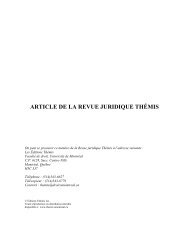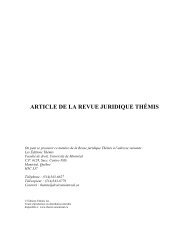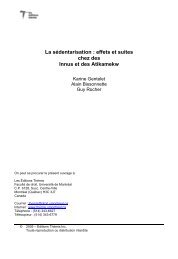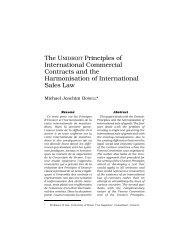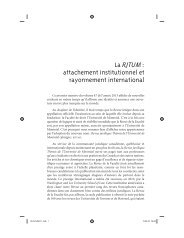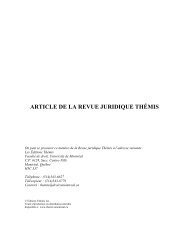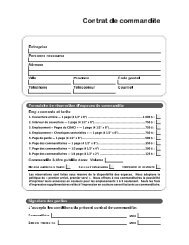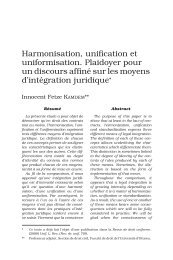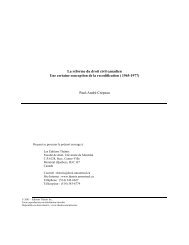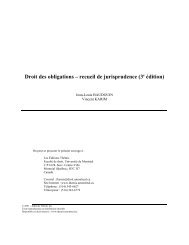The UNIDROIT Principles of International Commercial Contracts and ...
The UNIDROIT Principles of International Commercial Contracts and ...
The UNIDROIT Principles of International Commercial Contracts and ...
Create successful ePaper yourself
Turn your PDF publications into a flip-book with our unique Google optimized e-Paper software.
THE <strong>UNIDROIT</strong> PRINCIPLES AND MERCOSUR COUNTRIES 399<br />
§ 2° <strong>The</strong> parties may also agree that the arbitration takes place on the<br />
basis <strong>of</strong> the general principles <strong>of</strong> law, on the usages <strong>and</strong> customs, <strong>and</strong><br />
rules <strong>of</strong> international trade.<br />
Article 10 <strong>of</strong> the 1998 MERCOSUR Arbitration Agreements states<br />
that the parties can choose the law applicable to the dispute based<br />
on private international law rules <strong>and</strong> principles, as well as on<br />
i n t e rnational trade law. This provision actually embraces the<br />
principle <strong>of</strong> party autonomy in relation to contractual obligations<br />
<strong>and</strong> does not prevent the parties from choosing a non-legislative<br />
system, such as the <strong>Principles</strong>, to rule their dispute. <strong>The</strong>refore, in<br />
our opinion Article 10 <strong>of</strong> the Agreements does not conflict with<br />
Article 2 <strong>of</strong> the Brazilian Arbitration Law, for the former allows the<br />
choice <strong>of</strong> the <strong>Principles</strong> to rule the substance <strong>of</strong> the dispute<br />
submitted to arbitration.<br />
<strong>The</strong> party autonomy principle, which is central in modern<br />
c o n flicts-<strong>of</strong>-laws systems, is hardly applied by national judges in<br />
Brazil. However, the language <strong>of</strong> Article 2, paragraph 1 <strong>of</strong> the<br />
Arbitration Law undoubtedly validates the choice-<strong>of</strong>-law made by<br />
the parties <strong>and</strong> its effectiveness in arbitration proceedings. In turn,<br />
Article 2, § 2 <strong>of</strong> the Arbitration Law bears substantially the same<br />
meaning <strong>of</strong> Article 10 <strong>of</strong> the ME R C O S U R Arbitration Agre e m e n t s .<br />
T h e re f o re, there is only an apparent conflict between those pro v i-<br />
sions, <strong>and</strong> no contradiction arises on that point between the 1998<br />
ME R C O S U R Arbitration Agreements <strong>and</strong> the Brazilian Arbitration Law.<br />
Most possibly the question should be resolved by means <strong>of</strong> a simple<br />
i n t e r p retative declaration <strong>of</strong> the 1998 ME R C O S U R A r b i t r a t i o n<br />
Agreements.<br />
II.<br />
<strong>The</strong> Applicability <strong>of</strong> the <strong>UNIDROIT</strong> <strong>Principles</strong> in<br />
the MERCOSUR Countries<br />
We can easily note the lack <strong>of</strong> general acceptation <strong>of</strong> the party<br />
autonomy principle, in contractual matters, among the ME R C O S U R<br />
countries. <strong>The</strong> most likely outcome in cases submitted to the<br />
judicial courts is a clear refusal <strong>of</strong> the parties’ choice <strong>of</strong> the law<br />
applicable to the contract. <strong>The</strong> only exception to such rule occurs<br />
when the case is submitted to arbitration. We can there f o re draw<br />
the conclusion that the application <strong>of</strong> the <strong>Principles</strong> in the region,<br />
as it depends on the acceptance <strong>of</strong> the party autonomy principle,<br />
faces the consequences <strong>of</strong> the legislative diversity within the



